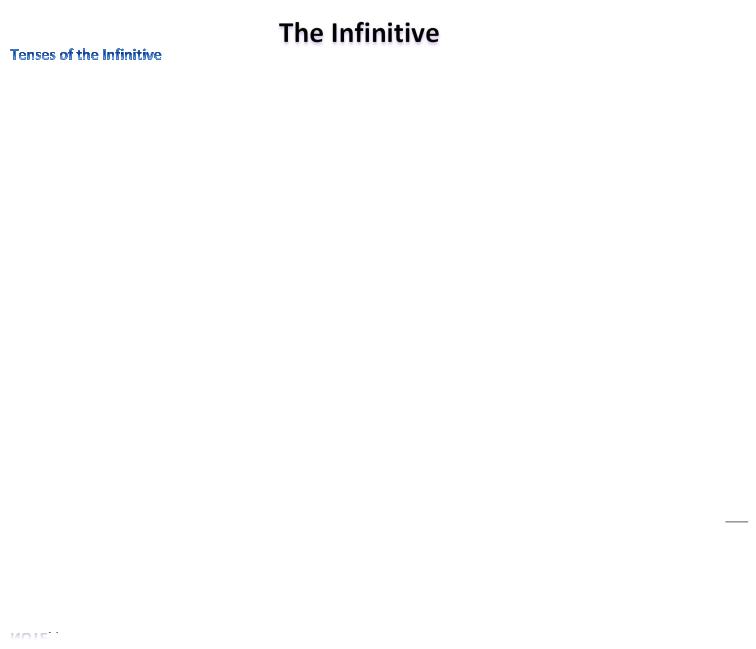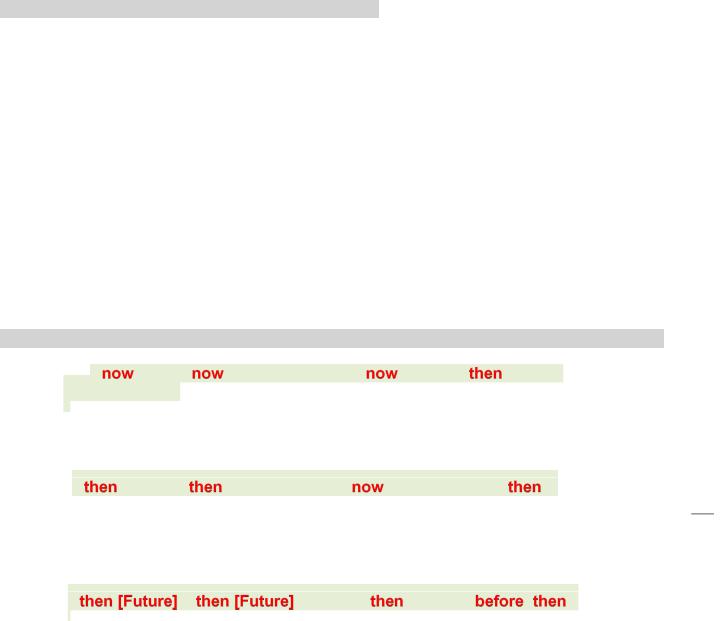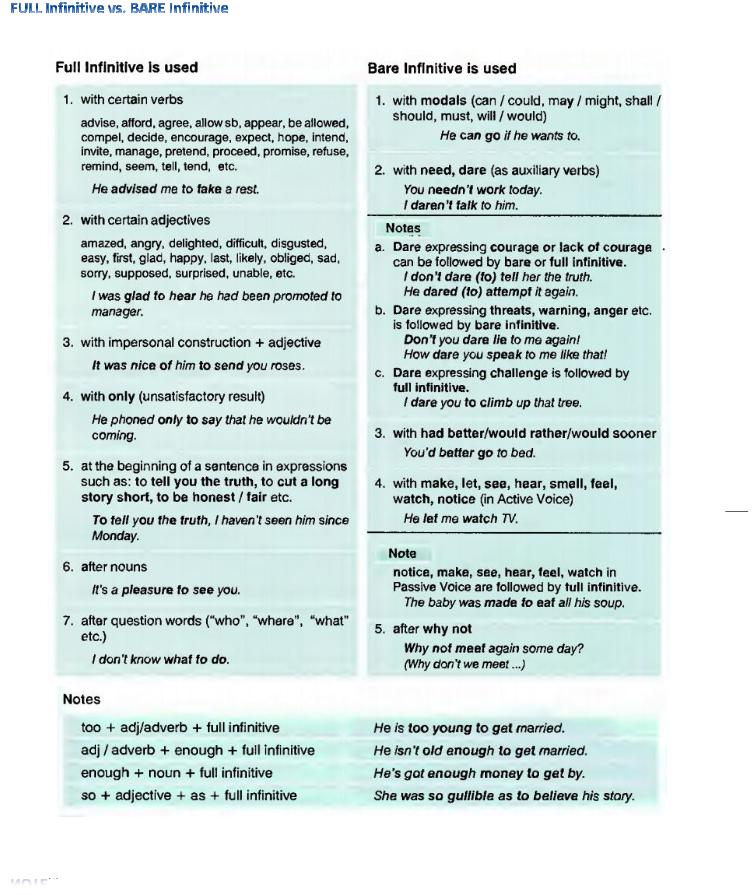
III(2)_The_Infinitive_St
.pdf
|
Active Voice |
Passive Voice |
||||
|
|
|
|
|
|
|
present |
|
|
to cook |
|
to be cooked |
|
presentcont. |
|
|
to be cooking |
|
--- |
|
perfect |
|
|
to have cooked |
|
to have been cooked |
|
perfectcont. |
|
|
to have been cooking |
|
--- |
|
|
|
|
|
|
|
|
The Present(Indefinite)Infinitive refers to the present or future.
I hope tomeet her tonight.
……………………………………………………………………..
The Continuous Infinitiveexpresses an action happening now.
He is sureto be sleeping now.
…………………………………………………………………..
The Perfect Infinitive is used to show that the action of the infinitive happened before the action of the verb.
He is glad to have gone there before the war.
……………………………………………………………………..
1
The Perfect Continuous Infinitive is used to emphasize the duration of the action of the infinitive which happened before the action of the main verb.
He seemsto have been working since earlyin the morning.
……………………………………………………………………..
 : both the Indefinite and Passive Infinitive can be used after “there is/are”.
: both the Indefinite and Passive Infinitive can be used after “there is/are”.
There isnothing to say.
……………………………………………………………………..
There isnothing to be said.
……………………………………………………………………..

1. Read and find the Infinitives and Infinitive constructions.
As medical science progresses, we are becoming an increasingly elderly society and, although living to a ripe old age can only be a good thing, it brings with it a large number of problems that we have yet to deal with properly. One such problem is that the burden of financing care for the elderly seems to be falling on a reduced percentage of the working population. The gradual but steady trend towards smaller families is likely to result in a smaller number of people to pay for the requirements of an increasingly elderly population. The services needed by the elderly appear to have stretched to breaking point. Nursing homes, homecare, meals on wheels and so on all need more investment if we wish our elderly to live as fulfilled and independent a life as possible.
Young people today are encouraged to start saving with personal pension schemes as early as possible to ensure an adequately financed retirement, since it is predicted that state pension levels in the future will not be enough to guarantee a continuation of the lifestyle they have become accustomed to. But we still have to cope with an expanding older population who are discovering too late that the steps they had taken to guarantee an income for their later years were not sufficient. Obviously, the pressure on public funds to subsidize this shortfall is enormous.
(AfterVirginia Evans, Linda Edwards, Upstream Advanced)
2. Read the following sentences and translate them into Russian. Comment on the forms of the Infinitive.
|
Jim |
is |
happy |
to be |
in Paris. |
Meg |
is |
happy |
to have gone |
to Paris. |
|
|
|
|
||||||||||
|
|
|
|
|
|
|
|
|
|
|
|
|
|
|
|
|
|
|||||||
|
|
|
|
|
|
|
||||||||||||||||||
|
|
|
одновременность |
|
|
|
|
|
|
предшествование |
|
|
|
|
|
|
|
|||||||
|
|
|
|
|
|
|
|
|
|
|
|
|
|
|
|
|
|
|
|
|
|
|
|
|
|
I |
was |
glad |
to be riding |
a bike. I |
am |
upset |
to have beenwaiting |
so long |
. |
|
|
2 |
|||||||||||
|
|
|
|
|||||||||||||||||||||
|
|
|
|
|
|
|
|
|
|
|
|
|
|
|
|
|
||||||||
|
|
|
|
|
|
|
|
|||||||||||||||||
|
|
|
одновременность |
|
|
|
|
предшествование |
|
|
|
|
|
|
|
|||||||||
|
|
|
|
|
|
|
|
|
|
|
|
|
|
|
|
|
||||||||
|
|
ll be |
happy |
to be invited |
|
|
|
|
I |
was |
happy |
to have beeninvited |
. |
|
|
|||||||||
|
I’ |
|
|
|
. |
|
|
|
|
|
|
|
|
|
|
|
|
|
||||||
|
|
|
|
|
|
|||||||||||||||||||
|
|
|
одновременность |
|
|
|
|
|
|
|
|
|
предшествование |
|
|
|
|
|
||||||
|
|
|
|
|
|
|
|
|
|
|
|
|
|
|
|
|
|
|
|
|
|
|
|
|
1.The police broke into the house to find the burglars gone.
2.He was sure that Rachel was about to make him very miserable indeed.
3.I find it difficult to go away for the night without a rather heavy suitcase.
4.Taking into consideration the English climate I like to have some woolens just in case.
5.Mr. Markby was pleased to have been approached for advice.
6.He was probably angry to have been scolded in my presence.
7.The rescue team were astonished to find the boy in the deserted village.
8.Eliza was delighted to have been dancing all night.
9.She pretended to be listening to music while her thoughts wandered elsewhere.
10.You must attend the press conference. You will be sorry to have missed the opportunity.
11.On the other hand, if we are unlucky enough to have inherited a weak gene (ген), then there is little to be done.
12.The postcard was written in French, in atiny economical script to take full advantage of the small space.
13.The youngprincess didn’t want to be seen in public with her new boyfriend.

1.The Infinitive as a subject. (подлежащее)
|
It’s useless to discussthe question. |
……………………………………………………………. |
|
Even to think of it gave him torture. |
……………………………………………………………. |
2.The Infinitive as a predicative (именная часть составного именного сказуемого).
|
My intention is to get into Parliament. |
……………………………………………………………. |
|
Mrs. Smith's flat was not easy to find. |
……………………………………………………………. |
3. |
The Infinitive as part of a compound verbal predicate.(частьсоставного глагольного |
|
сказуемого). |
|
|
|
The train was to leave at midnight. |
……………………………………………………………. |
|
Imprisonment beganto tell upon him. |
……………………………………………………………. |
4. |
The Infinitive as an object. (дополнение). |
|
|
She had learnt to dance at boarding school. |
……………………………………………………………. |
He found it utterly impossible to leave the place. …………………………………………………………….
5.The Infinitive as part of a complex object.
|
She saw him pick up a note. |
……………………………………………………………. |
|
I’d like youto listen carefully. |
……………………………………………………………. |
3
6.The Infinitive as an attribute. (определение)
|
I’ve never had time to examine the room. |
……………………………………………………………. |
|
I have nobody to saya kind word to me. |
……………………………………………………………. |
7.а) The Infinitive as an adverbial modifier of purpose.(обстоятельствоцели)
He put on his coat (so as) notto get cold. |
……………………………………………………………. |
b) An adverbial modifier of result. (обстоятельствоследствия) (this chiefly occurs after adjectives with enough and too.
|
His eyes were sharpenough to look after his own interest. |
|
|
He was too busy to see anyone. |
……………………………………………………………. |
c) An adverbial modifierof manner (comparison).
She nervously moved her hand towards her lips as ifto stop him.
…………………………………………………………….

8.The Infinitive as parenthesis (вводное слово или предложение)
Remember the following:
To begin with – начнем с того,что……….
To conclude – в заключение
To sum it up– в целом
To cut a long story short– короче говоря
To be honest / to tell truth– по правде говоря
To say the least (of it)– по меньшей мере
To put it mildly – мягко выражаясь
To make matters worse – в довершении ко всему
So to say – так сказать
To put it mildly,he was not up to the mark.
To cut a long story short,they thought it would be more economical to live at the villa.
4

5
 : In expressions after “nothing could be done…”,“he could do nothing….”,“whatcould he do…”, “the infinitive is used without to and is preceeded by “except” or “but”.
: In expressions after “nothing could be done…”,“he could do nothing….”,“whatcould he do…”, “the infinitive is used without to and is preceeded by “except” or “but”.
There’s noting to be doneexcept tell you the truth.
There was nothing he could dobut escape.
What could he dobut smile?

3. Insert “to” before the Infinitives where necessary.
1.He did nothing from morning till night but_____ wander at random.
2.You’d better _____ takethis job in Oxford.
3.They ought _____ have asked me my advice.
4.I’d sooner ___ die than___move to the suburbs from the city center.
5.Your mother has gone to somefriends, they do nothing but __ play bridge.
6.There’s nobody in the world I’d rather __ workwith or ____ have greater respect for.
7.Why not _____ try ______ engage her in some sports?
8.You’d better ______ leave now before the usual rush hour.
9.If you say you gave me no encouragement I cannot but ___contradict you.
10.I thought that I’d better ____ try ____move to the urban area where there are more opportunity.
11.Why not ____ employ Mark? he’s experienced and competent.
12.To know all is ___ forgive all.
13.Arthur could not but ___ glance at Daniel in silence.
14.It’s time ____ take severe measures to combat poverty in the country.
15.It might rain. We’d better _ take an umbrella.
16.I’m tired. I’d rather not___ go out tonight.
17.Shall we go by train? – No, I’d prefer ___ go by car.
18.Get them ____ come as early as possible.
19.Make them ___ come as early as possible.
20.There’s hardly anything____ do but ____ tighten the belt and start saving.
21.Why not __ take this freelance job?
4. |
Use the appropriate form of the Infinitive (Active or Passive). |
|
|
1. |
She only pretends _____. She isn’t easy _____.(frighten, frighten) |
6 |
|
2. |
He is sorry ____ way to panic then. (give) |
|
|
|
|||
3.I am glad _____ to you at the party yesterday. (introduce)
4.I didn’t expect ___ this question. (ask)
5.Don’t talk too much if you want___. (listen to)
6.Unpleasant things shouldn’t ______ .(putoff)
7.He is happy ____ through with this task. (be)
8.It’s bad of you ____ so much attention to triflingmatters. You should be more serious. (pay)
9.Dan is happy ___ first prize for this picture. (award)
10.He is sorry ___ your advice then. (not follow)
11.There are a hundred things ___. (do)
12.According to the schedule the plane was _____ long ago. (land)
13.It’s sensible of John _____ Kate this advice. I hope she’ll follow it.(give)
14.He is sorry ____ you in your work. (disturb)
15.It’s thoughtful of you ____ the flowers. She was pleased. (bring)
16.He claims ____Elvis Priestly. Who’ll believe him?(meet)
17.Aren’t you supposed _____ after your sister at the moment? (look)
18.I am sorry _____ you but I didn’t mean anythingof the kind. (disappoint)
19.It was considerate of my son __ of me when I was ill. (take care)
20.The woman pretended ___ and not____ the bell. (read, hear)
21.Ann would love ___ on the beach now instead of typing letters. (lie)

It’s + adj./noun + inf. be the fist/last/only + inf
5. Make up sentences according to the model
e.g. Following him is hard.– It’s hardto followhim.
e.g. It’s a relief that I see you safe and sound.– It’s a relief to see you safe and sound.
1.Banning smokingin publicplacesis very important.
2.Learning English is necessary.
3.Killing people is unforgivable.
4.Riding a bicycle is dangerous.
5.Interruptingpeople is impolite.
6.Dressing a wound is very painful.
7.Attending your classes is your duty.
8.It’s a pleasure that I can see you again.
9.Watching a comedy is very amusing.
10.Rushing through a book is useless.
6. Paraphrase the sentences using the above adjectives and participles.
Model: There is no pointin saying that now.
It was … (unnecessary) 7
It was unnecessary to say that now.
1.Keeping your eyes open when you sneeze is impossible. It is ….. (impossible)
2.She has difficulty in workingout this kind of problem.It's … (difficult)
3.Dou you have to pay a membership fee at that gym? Is it … (necessary)
4.I don’t have enough authority to run this department. I can’t do that. I … (unable/supposed)
5.The contribution to the discussion is obligationfor every student. Every student … (obliged)
6.We were in amazement when we learned that she had contributed to the hospital $18 million. We … (amazed)
7.It’s his luck that he has had a narrow escape. He … (lucky)
8.Ms Brown is an experienced accountant. She won’t refuse to handle the company’s accounts. She will be glad. She … (glad)
9.It’s our determination to seek after the truth. We … (determined)
10.He ignored the speed limit. It’s really dangerous. It … (dangerous)
11.You should always wear a seatbelt. It … (unwise)
7. Paraphrase the sentences using the words in brackets.
Model: I am delighted to meet such a distinguished man.
It … (pleasure) – It’s a pleasure to meet such a distinguished man.
1.I have been involved in such an interesting project. It is a privilege.It … (privilege)
2.I will resist the temptation and won’t go into detail of the scheme.I … (temptation)
3.The president underlined that he is determinedto pursue the rebels.The president …(determination)
4.Shakespeare: “I’m planning to turn Hamlet into a musical.” I … (make plans)

5.It was clear that she was ready to seek after the truth at any cost.She … (showa determination)
6.He won’t admit his fault, as one has to be a courageous man to face the music.It … (take courage)
7.Count Dracula: “I’ve applied to go to medical school.” I … (sendin an application)
8.Einstein:” I’ve decided to challenge my own theory.” I … (make a decision)
9.Fred Astaire: “If I troubled to learn, I might be a gooddancer.”If I … (take the trouble)
8. Translate into English using the Infinitive with it”.
1.Ему трудно верить.
2.Ей доставляло огромное удовольствие видеть, как играют дети.
3.Неплохо было бы поехать за город завтра.
4.Нам понадобилось много времени, чтобы убедить его, что он неправ.
5.Не предупредить его об этом было бы нечестно.
6.Вам не помешает, если вы займетесь спортом.
7.Очень приятно питьиз колодца холодную воду в жаркий день.
8.Джейн потребовалось полчаса на то, чтобыдобраться до города.
9.За этим столом хорошо работать.
10.Это моя обязанность – учит вас.
11.Некоторым людям трудно угодить.
12.Стихи трудно переводить.
9. Paraphrase using the Infinitive as an attribute.
Model He was the second who came tothe finish.
He was the secondto come to the finish.
8
1.I’d like to be the one who can be offered this job.
2.Safety is the first principle that must be observed in shooting competitions.
3.It’s the only important problem that our generation should face up to.
4.Commuting is the only thing that scares me from moving to the suburbs.
5.She was the last who learnt theterrible newsabout theirdivorce.
6.He is the last person who can cause us trouble.
7.She is the only one in the family who contributes money to charity.
8.He was the only applicant who received no reply to his letter.
9.It’s the only problem now that deservesour attention.
too+ adj./adverb. + inf. adj./adv. +enough + inf.
10. Complete the sentences according to the modal.
e.g. I’ m too busy …… - I’m too busy to come to the party.
e.g. John is intelligent enough …. – John isintelligent enough tounderstandthe problem.
1. |
There was too much noise….. |
7. |
Life is too tough….. |
2. |
8. |
||
3. |
William is too intolerant….. |
9. |
This period is too tough…. |
4. |
The traffic was too heavy…. |
10.The train was too overcrowded… |
|
5. |
The task waschallenging enough….. |
11.I becamewell-off enough….. |
|
6. |
She is experienced enough…. |
|
The living conditions are tolerable enough… |
|
He was mature enough…. |
|
|

11. Combine the sentences using the Infinitive with “too” or “enough”.
1.The wine is too harsh. It’s can’t be tasty.
2.The dress is cut well. It’s elegant.
3.The weather is frosty. It isn’t enjoyable.
4.She is far too bewildered. She can’t speak.
5.The suitcase was too heavy. It was impossible to carry it.
6.The car is very small. It’s impossible to fit in all the kids.
7.Life is very short. It isn’t worth hating anyone for long.
8.She is clever. She is at the top of the class.
9.Mr. Roberts is much too old.
12. Listen to the teacher and paraphrase the sentences according to the model.
Model 1: He is clever. He can answerthe question.
He is clever enough toanswerthe question.
Model 2: He is very ill. He can’t work today.
He is too ill towork today.
He isn't wellenoughto work today.
Model 3: She was the first/last/only lady wholeft.
She was the first/last/only lady to leave.
13. Translate to English.
9
1.Она набрала слишком много веса, чтобы сбросить его за такой короткий срок.
2.Джон был слишком озабочен своим состоянием, чтобы обратить внимание на сестру.
3.Недостаток жизненного опыта у Гарри был достаточно очевиден, чтобы предлагать ему эту работу.
4.Я была слишком возбужденной, чтобы позвонитьими поблагодарить.
5.Дом казался брошенным и достаточно старым, чтобы продать его за такую цену.
6.Новая работа оказалась слишком трудной,чтобы он мог справиться с ней.
7.Он слишком горд, чтобы занимать у вас деньги.
8.Она слишком молода, чтобы воспитывать детей самой.
9.Расходы на проживание в городе слишком велики, чтобы молодая семья могла прожить, не занимая денег.
10.Все было сделано достаточно быстро, чтобыспасти его.
14. Paraphrase using the Infinitive as an attribute.
Model I.
 : the Infinitive serves as an attribute to pronouns and expressions of quantity such as much, little, enough, a lot, a greatdeal.
: the Infinitive serves as an attribute to pronouns and expressions of quantity such as much, little, enough, a lot, a greatdeal.
e.g. Here are some instructions that must be followed. Here are some instructionsto be followed(to follow).
1.These are the measureswhich must be taken .
2.There is nothing one can be ashamed of.
3.There was so much that was to be done.

4.There is nothing in his life that he may be proudof.
5.There is so much one can lose, there is so little one can find.
6.There was nobody here who could help him adapt in the new environment.
7.We had nowhere we could stay at for the night.
8.She’ll always find something one would talk about.
9.There was nothingwe could argue about.
Model II: e.g.The question that will be discussed at the meeting is very important.- The question to be discussedat the meetingis very important.
e.g. Ihave a child who must be looked after.– I have a child to look after.
1.The people who will be invited to the conference must take an active part in the work.
2.He knows all the places in the town that can be found there.
3.The railway that will be built there will jointhetwo industrial centers.
4.The next patient that was to be examined was a nice girl inher early teens.
5.Honesty is the first principle that is to be observed when working with us.
6.I have a question or two which must bepaid attention to.
7.He is not the man who will draw back when dignity is concerned.
8.The ship has arrived with the pictures which will be displayed at the international exhibition.
9.I have a lot of problems that must be solved.
10.We had no time one couldlose.
11.The library has received a list of the books which will be published this year.
12.They had a friend one could get along with.
15. Translate the sent into English using the Infinitive as an attribute.
10
1.Вот книга, которую надо прочитать.
2.У нее есть друзья, которые могут навеститьеe во время болезни.
3.Он не был человеком, который быстро привлекал к себе внимание.
4.Она первой прервала молчание.
5.Джек знал, что нельзя терять время.(Therewasno……….)
6.Последний, кто навестил Анну, был её сын.
7.У нас есть хороший анекдот, который мы можем рассказать вам.
8.Я позже всех разгадал ее намерения.
9.У нее есть ребенок, о котором надо заботиться.
10.Она тотчас почувствовала, что у них есть что-то, что нужно сообщить ей.
16. Complete the sentences according to the model.
 : we should always use the Indefinite Infinitive in the Active Voice.
: we should always use the Indefinite Infinitive in the Active Voice.
It’s interesting to talk toher.– She is interestingto talk to.
1.It’s hard to followhim.
2.It’s pleasant to look at her.
3.It’s not easy to please the old lady.
4.It’s hard to find a good friend.
5.It’s easy to teach this subject.
6.It’s nice to work with calm people.
7.It’s not easy to find a road here.
8.It was difficult to decide the matter.
